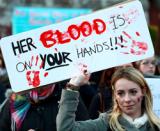
London, November 21: Amid a raging debate on the country's strict abortion laws, Ireland's Catholic bishops have said that the church “has never taught that the life of a child in the womb should be preferred to that of a mother”.
Reacting to the death of Savita Halappanavar, the standing committee of the Irish Catholic Bishops Conference said on Monday night that her passing, along with her unborn child, was “a devastating personal tragedy for her husband and family. It has stunned our country”. In the light of the widespread discussion following the “tragic death of Mrs Halappanavar and her unborn baby”, the committee wished “to reaffirm some aspects of Catholic moral teaching”.
The bishops said that a mother and her unborn baby were both sacred with an equal right to life. According to “The Irish Times,” they said that “whereas abortion is the direct and intentional destruction of an unborn baby and is gravely immoral in all circumstances, this is different from medical treatments which do not directly and intentionally seek to end the life of the unborn baby.
“Current law and medical guidelines in Ireland allow nurses and doctors in Irish hospitals to apply this vital distinction”.
They added: “Where a seriously ill pregnant woman needs medical treatment which may put the life of her baby at risk, such treatments are ethically permissible provided every effort has been made to save the life of both the mother and her baby”.





Comments
Add new comment